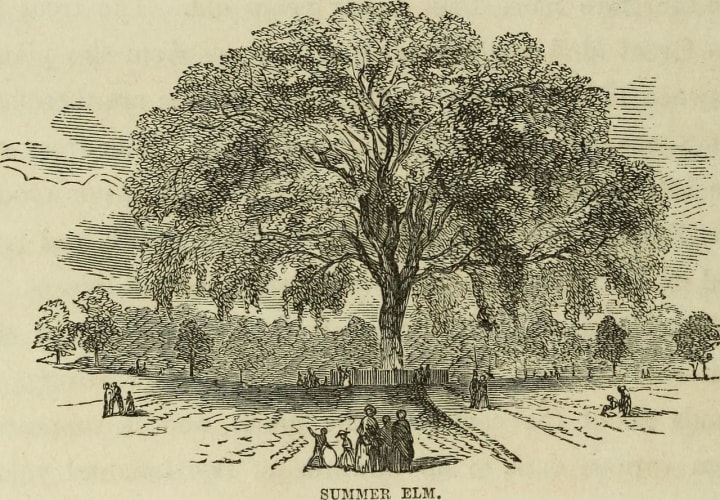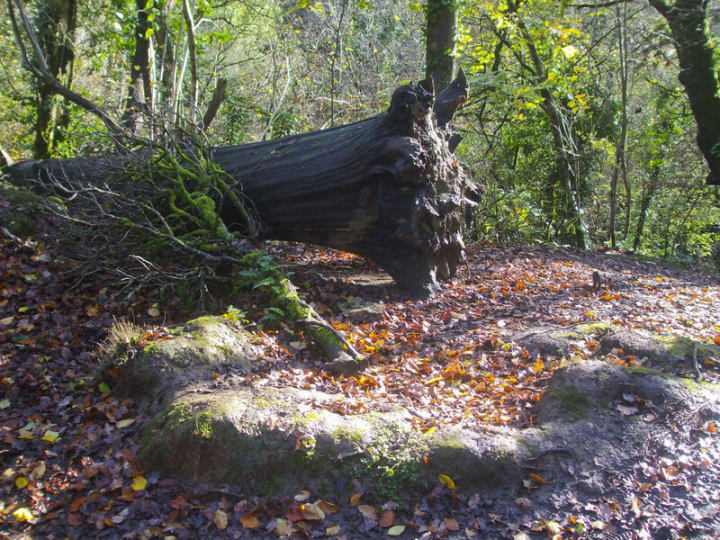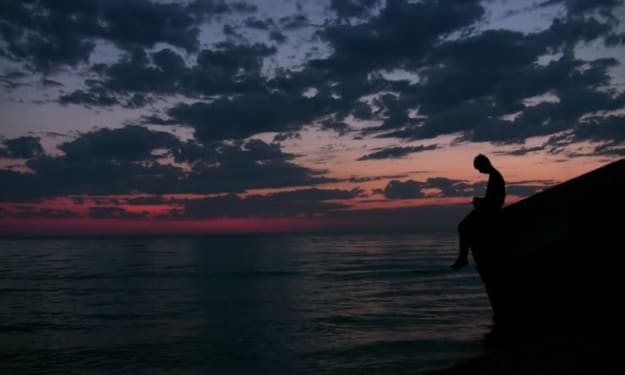The Great Elm
Imagine a world where trees no longer existed. A Summer Fiction Series Challenge story.

“Can you tell me another story about trees?”
Maria sighed, sweat pooling on her forehead. She had been expecting the question ever since they had passed that withered old stump a few miles back.
“Another story about trees it is then,” she said, adjusting herself, making sure that she was fully in the shade. The desert rolled by on either side of the convoy, a lonely line of beat-up old trucks and caravans. There was nothing but cracked earth and dust clouds in all directions, hardly an inspiring scene for a story about green leaves and budding plants.
Nancy looked at Maria expectantly, waiting for the story to begin. Her eyes were like pools of water. God what I would give for some water that didn’t come from a condenser or waste filter, Maria thought.
“Right,” she said, desperately searching for a story worth telling. She had never paid much heed to trees, back when they were everywhere. They had been a fact of life, part of the background, something you took for granted. They always say that you don’t appreciate something until it’s gone, Maria thought, still searching for inspiration. That’s probably why we’re in this mess.
“Ah-hem,” Nancy cleared her throat dramatically and fixed Maria with a glare far more severe than any eight-year-old should have been able to muster.
“Sorry,” Maria said. “I was just figuring out how to begin.” That was always the hardest part, and not just because it meant dredging up memories of different times. She thought back to her old life, the life she had when trees existed and the world had not given way to sprawling wasteland, the life she had in Boston, before it was submerged by rising, broiling oceans. She had owned her own apartment, with sunburst marigolds growing in window boxes, and had—. No, she thought, we don’t go there. We don’t think about that. She had to go there, however. It was the only place she had left for a story about trees.

“Have I ever told you about the Great Elm?” she said, knowing full well that she had not.
“No,” Nancy said, the delight of an untold tale lighting up her eyes. She sat, elbows on knees, hands supporting her head, desperate to hear more. “What kind of tree is an elm?”
Was, Maria thought. What kind of tree was an elm?
“They were deciduous trees. That means—”
“I know what that means!” Nancy interrupted. “It means that its leaves fall off each year and then grow back.”
“Very good. The leaves had serrated edges, a bit like a knife, and were oval-shaped. They turned the most glorious colour in the fall, like gold. Can you picture it?”
“Yes, I think so,” Nancy said, closing her eyes, imagining.
“Good. Think of those things, but on one of the biggest trees you’ve ever imagined. Then you’ll be close to the Great Elm. I read that it stood seventy-two feet tall. That’s,” she eyed Nancy in mock appraisal, quickly running some rough calculations in her head, “over eighteen of you, standing on top of one another. Its trunk was so thick that you and I could have hugged it from opposite sides and been nowhere close to touching fingertips.

“As you can imagine, the Great Elm had to be very old to grow that big. It stood in the centre of Boston, in the Common where—”
“Boston?” Nancy interrupted again. “Isn’t that where you’re from?”
“It is,” Maria said, wondering how Nancy knew that. She must have overheard Maria talking to one of the other ‘vanners. What else has she overheard that I don’t know about? “I never saw the Great Elm myself, though, only read about it.”
“How come?”
“Patience! We’ll get to that. If you stop interrupting, that is.” She smiled at Nancy to show that she did not actually mind her interjections. “As I was saying, the Great Elm stood in the heart of Boston. It had been there since before the city was founded, witnessing the first colonists as they established themselves there. That’s why it was sometimes called Boston’s oldest inhabitant.
“The tree and Boston grew together and during that time, they both witnessed some of America’s most historic moments.”
Maria paused her story and looked out from the shaded back of the jeep that they rode in. America. Desert and dust, that was all that remained. People still acted as though it existed, but what was America without Washington D.C., New York, L.A., and New Orleans? What was America without the sprawling forests of Yosemite or the titan trees of Sequoia? What was America without fresh water and grass? The whole country had become Death Valley and then, at some indistinct point, it had not even been a country at all. Like the trees, America was gone. The convoy continued to roll across the blasted wasteland, passing over the corpse of a nation. Oh say can you see, by the sun’s blazing light…

“What kind of things did the Great Elm see?” Nancy asked, bringing Maria back to the present.
“War and revolution, mostly. The British camped there during the Revolutionary War, using it as their base for Lexington and Concord, and then American troops were stationed there during the War of 1812.” Oh, how it all seemed so ridiculous now; taxation, representation, empires, liberty, none of those things mattered when the water ran out and the ice caps melted. The right to bear arms and everything else in the Constitution didn’t mean a great deal when you were dying of thirst and the Capitol Building was underwater. “Those things probably don’t mean a great deal to you,” Maria continued, “but they were once some of the most important events in this country’s history. Legend has it that the Sons of Liberty met beneath its wide branches to plan the Revolution, hanging lanterns on its branches as a show of unity. Imagine what it must have looked like, this great tree, its dark boughs painted in orange and red as whispers of hope and freedom passed beneath its leaves.”
Nancy let out a wistful sigh at the thought, not because of the revolutionary heroes or the moments of immense significance that the tree had borne witness to, but because of the image of the tree itself: of its branches, twigs, and leaves, stretching out across the sky; of its trunk, vast and ridged with bark; and of its roots, hidden in the deep, wet earth, growing in secrecy. It was strange to think that she had never seen a tree, that they were this mythic thing to her, like fairies or dragons.
“Ay-up!” Kit, the driver of their truck, pulled down the window that separated his compartment from the passenger section at the back. “Looks like a storm’s comin’. We’re gonna have to stop in a mo’ and batten down the hatches.”
Maria and Nancy both turned to peer through the windshield. The horizon was dominated by a wall of black clouds. It rolled ever closer, lightning flashing deep within. Soon it would be upon them, pelting the convoy with hailstones and lashing it with vicious winds.
The procession of trucks, vans, and four-by-fours ground to a halt, each vehicle parking behind the next to form a tight ring. There was a sudden flurry of activity as men and women, Maria amongst them, leapt to the cracked earth and began linking the vehicles together with heavy chains. Others dragged heavy bolts and mallets from the backs of wagons and began pegging every chassis to the ground. More still produced rolls of tarpaulin, which they fastened to cover windows and wingmirrors. In the centre of the ring, a huge plastic sheet was unfurled, funnelling down into a large tub. Storms were time of danger and anxiety, but they were also rare and precious opportunities to gather rainwater or melt hail. A tempest like the one approaching could spell disaster for a convoy but it could also save it from dehydration and death.

With the entire convoy secured, everyone disappeared back inside their carriages, securely closing the doors, hatches, and canvas flaps behind them. A nervous silence fell over the ring, punctuated by the occasional distant rumble of thunder.
“Do we have time to finish the story?” Nancy asked once Maria had settled herself.
“Let’s try,” Maria said. “Where did we get up to?”
“You were telling me about the lanterns.”
“Oh yes, I remember. I was explaining all of the history that the Great Elm bore witness to. As I said, it spanned nations and lifetimes. It grew from seed while the Native Americans still spanned the continent and it watched as Massachusetts passed from their hands to the British settlers and from them to the American people.
“It wasn’t just history that the tree saw unfold beneath its leaves, though. From the heart of Boston Common, it watched people go about their lives. Think of how many thousands of people fell in love, shared stories, suffered broken hearts, made business deals, played games, shared hopes and dreams in the shadows of that tree.” Did any of them ever imagine what the world would end up like? Maria thought as she gave Nancy a moment to imagine the kaleidoscope of experiences that passed beneath the Great Elm during its long life.
“So, what happened to the tree? You said that you had never seen it yourself?”
“Although the people of Boston loved and admired the tree, they also did not treat it well. It was common for people to climb its ancient branches and hangings were often held there too, the bodies of criminal and rebels left to swing from the low boughs.” Maria paused, allowing Nancy a moment to grimace in horror, before continuing. “By the time the city authorities erected a fence around the tree, it was too late. Its great trunk was rotten and full of holes so big that children could curl up inside them! Storms had lashed it, and many branches were so broken that they had to be propped up with poles and bolted back together, like how we fix the vans to the ground.”
“The poor tree,” Nancy cried.
“It was another storm that finally brought it down,” Maria went on. “It tore the Great Elm from the earth and threw it down upon the Common. This was hundreds of years ago now. The people wept for the tree, even though they had played a part in its death. A plaque was placed where the tree had stood but that is gone now too, turned to rust beneath the sea.”

“Oh,” Nancy said, eyes downcast. “And that’s the end of the story?”
“It is.”
“It’s not a very happy ending at all. I don’t like it.”
“Not all stories have happy endings, least of all the true ones.”
“Oh.” Nancy fell silent. It was dark inside the back of the truck and warm too, as the storm had not yet blocked out the relentless sun. It would soon be upon them though; the thunder was growing louder and more frequent.
“Do you think I’ll ever see a tree?” Nancy asked.
“I’m sure that you will,” Maria lied. “Kit told me that we’re turning north soon, towards the mountains. It’s not so hot there, so maybe we’ll find trees in that direction.” Or more dust and horror; that’s all we ever find.
“I hope so. I would love to see one. You make them sound so magical.”
“I wish more people had shared your love for them,” Maria said. “Now come here; the storm’s about to hit.”
They held each other close as the wall of wind and thunder crashed into the convoy, each of them praying that they would not share the Great Elm’s fate.
Just as there is no happy ending to this story, there will be no happy ending with climate change.
About the Creator
Alex Hawksworth
Full time History teacher and part time writer. I try to write the kind of stories I would like to read.






Comments
There are no comments for this story
Be the first to respond and start the conversation.